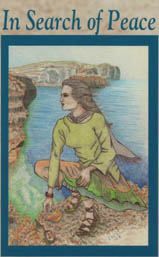 | In Search of Peace Introduction Yana Mintoff Bland |
Like a bouquet of roses, the women writing in this book bring a fresh waft of perfume into the dark room. They glisten in different shades, each with a different perspective, each with a different background, each with a different perfume, but all living in the cause of peace through justice and equality.
The book begins with two personal quests: a seminal trip from Cyprus to Istanbul made by Ninetta Pourou-Kazantzis and a move from Austria to Jerusalem by Rosina Fawzia AlRawi -"It was an enriching experience and it made me realize that simplistic reductionism rarely generates satisfactory solutions."
"The authentic city, Algiers, has lost its colors, thrown open to all misfortunes. For, Algeria has become the name of death. "The rattling sound is heard, the erratic pulse touched in Aicha Bouabaci's beautiful script. A divided Cyprus cannot progress in peace, attests Maroulla Vassiliou. Fortunately more and more people, especially women among both the Greek and Turkish Cypriots, are now working toward a Federal State.
Dr. Maja Kandido-Jaksic from Serbia takes us back in time and space to the origins of the cult of the warrior and the cult of motherhood. How often have we wondered how men could have committed such outrageous offenses against women: mass rapes, mass abduction of young girls, even massacres. In this analysis of the beginnings of sexism and militarism, Dr. Kandido-Jaksic's first hypothesis is that the "patriarchal division of sex roles is clearly linked to the formation of a particular personality structure." The warrior is carefully constructed. It will need just as much attention to dismantle.
Professor Dimitra Papadopoulou shares the wisdom she has gleaned from many years of experience educating and organizing multi-disciplinary courses on peace education at the University of Thessaloniki in Greece, and shows how this can be achieved at an advanced level. Dina Vardaramatou emphasizes the importance of Greek and Turkish women meeting and "working to create mechanisms to de-escalate tensions."
Basic human rights are a prerequisite to peace. This is the theme of Palestinian and Israeli writers. Shadia El-Sarraj speaks of the terribly cruel conditions in Gaza, where the rate of unemployment is now 68%,'where hundreds of Palestinians have been killed by Israelis during the past few years, and 40% of Palestinian children have to leave school to scrounge a living in the streets or sweatshops.
Roni Ben Efrat's incisive summary focuses on the disasters of the so-called "peace process." "The problem of our conflict is not one of this or that leader but of the framework itself". . . "Palestinians live within two prison systems. . ." "Our daily life is full of examples showing the extreme Jewish attitudes towards Arabs", writes Fatheia Awaisy from Nazareth. She analyzes education in Israel, with its ingrained racism, and suggests ways io change values. "Our first goal is to change the present government's policies so that they have a positive rather than a negative impact on the peace process. . ."
Sanaa Osseiran's experience of educating for peace in Lebanon is extremely valuable. Her spirit pervaded the conference and is central to this book. Elham Bayour gives a startling exposure of the fact that Palestinians, especially women, cannot work, receive an education, or obtain health care in Lebanon.
Helena Dalli of Malta emphasizes the importance of solidarity with victims of violence and gives examples of Maltese and other Mediterranean women attempting to eradicate all kinds of violence and propagate peace. Her unique suggestion is that Malta-located in the middle of the Mediterranean-could serve as a center for conflict resolution.
Renee Laiviera and Marie-Louise Coleiro both describe Malta's commitment to peace, at home and in the Mediterranean as a whole. A proposal for the creation of an educational institute for the advancement of Mediterranean women was made by Marie-Louise Coleiro. The Tunisian Model-concentration on human rights, continuing education, and "a peace built through forgiveness and the acceptance of differences"-is described by Halima Al Sadya Alkabali.
In the concluding section, guest speaker Dr. James Calleja writes a thought-provoking summary that reflects his long engagement with peace education. "Unless there is peace education," he argues, "and unless children learn how to establish peaceful relations and how to manage unpeaceful ones, how can we expect peace?"
Palestinian refugee Myassar AI-Hasan of Jordan takes the analysis of how to advance human rights onto an international level. "Peace is a dynamic process of co-operation among all states and peoples," and requires active participation in the implementation of International Humanitarian Law, especially for the millions of stateless Palestinians of the Mediterranean. Finally, a moving appeal from Evgenia Kiranova of Bulgaria for women's solidarity in building a Mediterranean zone of peace- "Peace is life. We women give life."
The diversity of participants and a very deep commitment to peace are further revealed in reports of workshop discussion and conclusion of the Associations sixth annual conference held at Balzan, Malta, June 25-29th, 1997. The dedication of these writers and activists gives just an inkling of the tremendous latent power for peace. The door is ajar.
I would like to thank Marlene Saliba of Malta for suggesting five years ago that we concentrate on Education for Peace and for being persistent about the need for us to transcend our discussion and analyses of war, inequalities, capitalism and patriarchy "On paper, most Mediterranean countries have agreed to educate for human rights and the maintenance of peace (Article 13 of the United Nations Covenant on Economic, Social and Cultural Rights, 1976), so we have the right and the duty to turn the words of this mandate into deeds."
May this short introduction be but a prelude to greater pleasures in reading this anthology of writings that are not only historical, psychological and political but also personal positive and powerful. A delicate but determined perfume. A seashell on the shore, we offer this to you. May we, together, build a Mediterranean and a world based on justice, equality and peace.